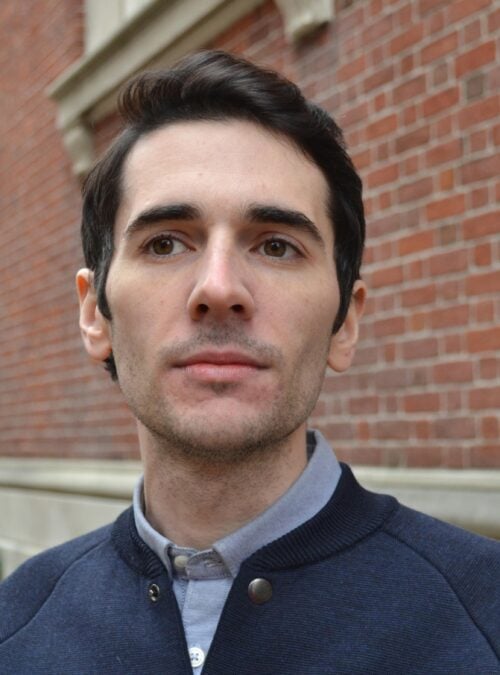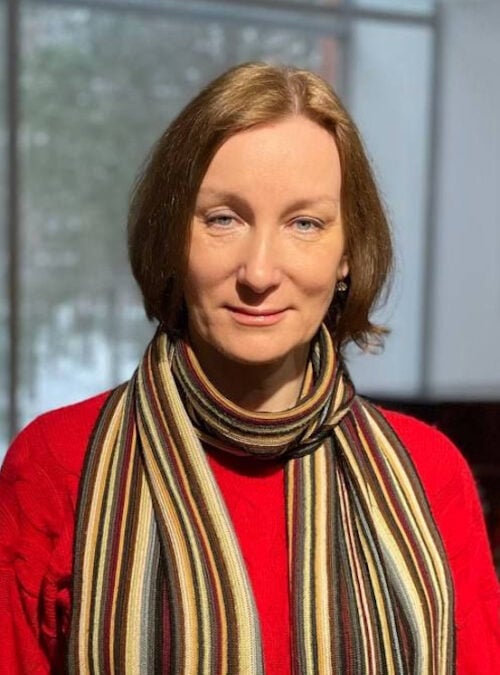“Music comes first”.
Interview with Carole Cavallera
Author: Thea Rimini, Université de Mons - Université libre de Bruxelles

For many years now, Carole Cavallera has been restoring to French the voices of the great writers of Italian literature, philosophy and literary criticism, such as Malaparte, Bevilacqua, Foa and, more recently, Chiaromonte, Tabucchi and Serra. Despite such a vast experience, his account of past translations and future projects conveys an undiminished enthusiasm.
Could you tell us how this passion for Italian literature came about?
To be honest, it’s more a passion for literature as a whole, regardless of nationality. But the passion for translation came about quite unexpectedly. I’d just come back from a holiday in Italy, during which I’d read Alberto Bevilacqua‘s La polvere sull’erba, and I was stunned to discover that this beautiful novel had not been translated into French. I mentioned it to Colette Lambrichs and Joachim Vital, from Éditions de la Différence, and they suggested I translate it myself. I’d never thought I’d get into literary translation before!
Strangely enough, they gave me this gift when my father died. Both my parents were of Italian origin, but it was my father who absolutely represented Italy in the family; he divided his life between France and Italy. So I started translating with a photo of my father on my desk. It was he who gave me the strength to do it and I did it for him.
I didn’t study Italian at school; Italian was the language of the family, the language of emotion, and through this translation I returned to my origins. Translating La polvere sull’erba (La poussière sur l’herbe) was a wonderful adventure, which has continued to delight me.
Emotions have played an important role in your career as a translator…
I’d say immense, and it’s still ongoing. In Nice, the town where I grew up, both my grandmothers spoke “border Italian”; let’s be clear, they never managed to speak French properly. One spoke a mixture of Italian and French, while the other spoke a rather eccentric form of French, based on Italian: she was constantly inventing new words. Looking back, I find that these two languages, which my friends didn’t understand, were very poetic. I grew up with the music of Italian, its rhythm and phrasing. Its linguistic structure was deeply, intimately rooted in me, and I became aware of this as I translated.
In both French and Italian, I’m sensitive above all to the musicality of a text, and that’s exactly what I like to recreate when I switch from one language to the other: the melody that the author purveys to the Italian reader must not be lost in translation, even if, obviously, it won’t be the same music in French. My dual roots – intellectually, I am profoundly French; perceptively, I am profoundly Italian – help me to preserve this music.
Your statements echo what Meschonnic said about the importance of the rhythm of translation.
Exactly. And I can spend days and days on a sentence looking for this harmony between the two languages. Sometimes I even sing the Italian sentences and then my French version to find the right translation!
In your career, you’ve translated both classic authors and more contemporary ones. Which author has required the most effort from you?
With Malaparte, for example, the challenge was immense, because the texts I translated were unpublished, and for the most part unfinished. With the exception of Il compagno di viaggio, where the writing is complete, the other texts, Muss, Il grande imbecille, are ‘works in progress’: you find the author in the process of creating, it’s dizzying, as if you were sitting next to Malaparte as he wrote. I had the impression of being in the position of a voyeur, of entering his intimate world. What fascinates me most is grasping the mechanism of a piece of writing, and in this case I was not disappointed. With Malaparte, it’s really the words that drive the ideas.
I imagine that it’s not easy to translate this mechanism…
The editors of the Table ronde, who published these texts, asked me to give them a more accomplished appearance, to abandon this sort of circle around the words which, objectively, is repetitive. So I tried to relax this mechanism so as to cause as little discomfort as possible for the French reader. It was painful at first because I felt like I was betraying Malaparte; but I think they were right because he himself was planning to rework these pamphlets.
What about the difficulties with other authors?
Like all translators, I’ve often had to deal with the use of dialect, particularly in Piero Jahier‘s work, and the polyphony it allows in Italian. It’s difficult to reproduce in a language that is as “Jacobin” as French is. For me, there is a great temptation to use southern regionalisms that are very familiar to me and would sound perfect; I resist this most of the time by imagining a reader from Paris or Lille.
In a completely different field, essays, theoretical texts or even philosophical ones, such as those by Nicola Chiaromonte or Vittorio Foa, for example, can make things difficult for me. Italian philosophical writing is often more German than French, with a much complexity at the sentence level. The challenge then is to insert the complexity of this progression into a “French garden”.
Doesn’t translating imbalance into balance mean betraying the source text?
Precisely, the difficulty lies in avoiding simplifying choices that would distort the construction of the thought; I essentially work on syntax and punctuation with the idea that they illuminate the grey areas, or at least mark them out like lanterns.
And then, in philosophy, there’s the added need to make sure that the use of this or that word won’t change the deeper meaning, erase the implicit reference to another author; I’m always afraid of not spotting an intertextuality, which is why this type of translation is much more thoughtful and requires a lot of research. When an author draws on one of his predecessors, I check the terms used in authoritative translations in order to restore this link in the translation, so that the informed French reader can trace this intellectual genealogy.
This pitfall is not always absent from literary translation, but it is rarer, or more visible. In short, the challenges that these two genres throw at the translator certainly represent intellectual gymnastics.
You’ve put a lot of emphasis on the musicality of translation. Do you think we can teach future translators how to recognise this? What do you think of translation schools?
I’m very curious about this sort of apprenticeship and wonder what they teach. Of course, if there are courses to learn to write, there might as well be courses to learn to translate… But I confess that, in both cases, I don’t really see what comes under the heading of acquiring knowledge.
Have you met any of the living authors you have translated?
I was lucky enough to meet Alberto Bevilacqua and have discussions with him about the translation of his work; he read enough French to appreciate it. I often worked with Maurizio Serra: as he is perfectly bilingual, I’d say it was more a collaboration than a translation. We exchanged ten emails a day about a sentence or a word. What’s more, he modified his Italian essays for the French readership, before the translation and sometimes even while I was translating! He has an admirable knowledge of French literature, which gives him a very literary language (style), and he would suggest words that were often rare, sometimes obsolete. We had some battles – always in a very friendly manner, I assure you – when I felt that a Frenchman, even a cultured one, was going to stumble over this or that issue.
Whatever the case, dead or alive, I talk to authors all the time. Luckily I can work at home and not in a library: while translation, like creative writing, is usually a silent process, I spend my time talking to the author I’m translating, commenting on his or her choices and the effects he or she is trying to achieve. That’s another aspect of translation: no literary analysis has ever allowed me to go so far in understanding an author’s style and rhythm…
How do you choose which texts to translate? Do you suggest them to publishers?
It depends. For a long time I submitted texts myself. A few years ago, I suggested an author to Le Serpent à plumes, Giancarlo Fusco (Mussolini et les femmes, 2010) (Mussolini e le donne), who I find funny and biting, but who unfortunately didn’t do very well in France. For the ‘Cahiers de l’Hôtel de Galliffet’ collection, it’s Paolo Grossi who offers me translations, and they are often gems. Unfortunately, I teach literature in preparatory classes and my job has become terribly time-consuming; I don’t have enough time to find authors I’d like to translate. I can’t wait to devote myself fully to this.
In 2023, Italy was given pride of place at the Paris Book Festival. Is Italian literature doing well in France?
We’ve finally come out of the period when noir novels took over everything, as if all Italian literary production was reduced to this genre. The Salon du Livre was an opportunity to showcase the diversity of transalpine literary creation, albeit with some facile effects of fashion. However, it is always regrettable that sales figures determine translations.
In the translation process, proofreading is a very important phase, but this role is disappearing in publishing houses. What is your experience of this?
For the ‘Cahiers de l’Hôtel de Galliffet’ series, Paolo Grossi, who has an extremely attentive and respectful eye, carries out this task. At Éditions de la Différence, I met an extraordinary young woman who, without knowing the source language, Italian, was able to grasp the tone of a book; her perplexities about certain passages that I had translated were always pertinent: something could be improved, not so much in the French sentence as in the faithfulness to the original text. That’s extraordinary for people who enter a book through the only door we’ve opened for them.
There’s a lot of talk these days about neural machine translation. Do you think literary translators will be able to take advantage of these tools, or will they be threatened?
The profession of translator is not always valued and I think that this will get worse with translation software. I’ve tried them out on press articles, and they quickly produce a first version, which is admittedly not very elegant, and sometimes wobbly or wrong (no doubt it will be less and less so), but it is practical.
On the other hand, I’ve had fun doing the same thing with literary fragments, and the result is absolutely crisp. It’s the work of a surrealist translator!
These tools are allergic to style, to creative, poetic language, to language that goes beyond common usage, the only language that counts in my eyes in literature. I want to believe that they will never be able to hear music or see a landscape. I often went to the places where the novels I was translating were set. I remember a trip to Trieste to get closer to Voghera, another to the Po plain for Bevilacqua; I prowled around San Vittore prison in Milan when I was translating La Pasqua rossa (La Pâque rouge). Seeing what the author has seen helps me to decentre myself, leads me towards the atmosphere of his or her sentence. You have to breathe with the author you’re translating, and I can’t imagine an artificial intelligence being able to do that.










